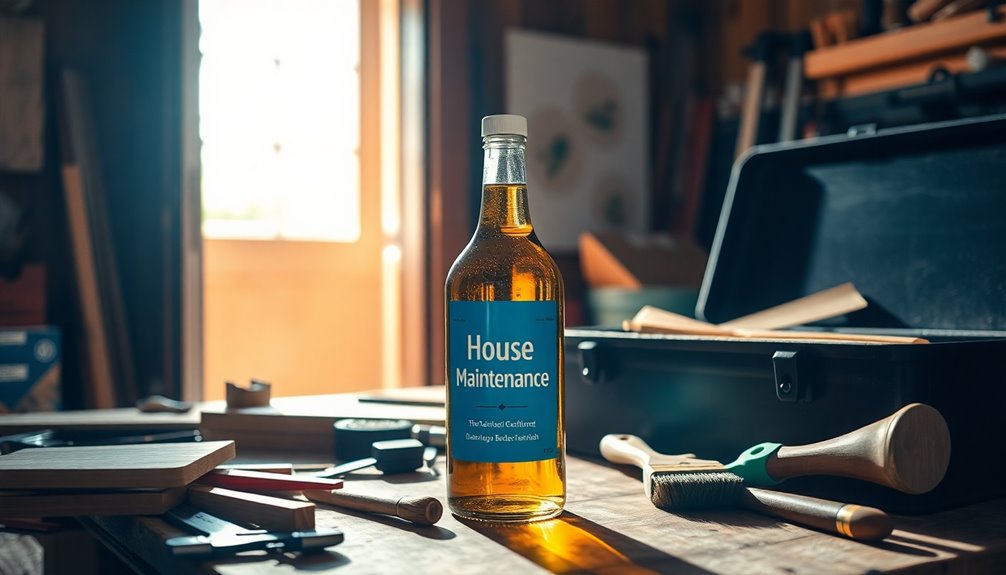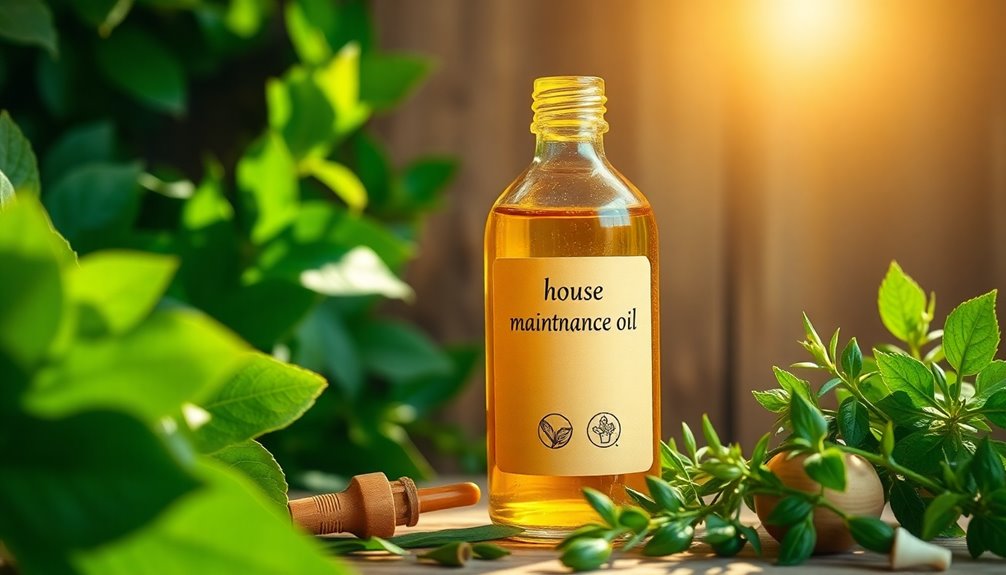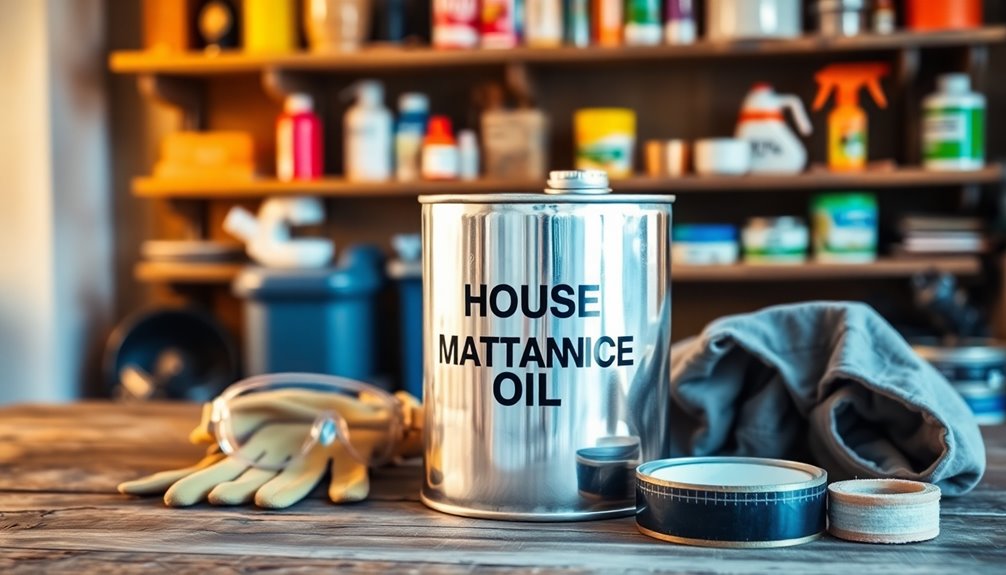House maintenance oil is an excellent budget-friendly alternative for your home. It's versatile, working wonders for lubricating hinges, protecting outdoor equipment, and maintaining wooden furniture. You can save money by opting for homemade cleaners infused with natural oils, which cost considerably less than commercial options. Plus, these oils are eco-friendly and promote a healthier indoor environment. With proper storage and regular maintenance, you can guarantee long-lasting efficacy and safety. It's a smart choice for both your wallet and the planet. If you stick around, you'll uncover even more tips and tricks for maximizing your home maintenance efforts.
Understanding House Maintenance Oil
When it comes to keeping your home warm during those chilly months, understanding house maintenance oil, or heating oil, is vital. This cost-effective option provides efficient heat production, allowing you to maintain a cozy atmosphere without breaking the bank. Millions of households in the U.S. Northeast rely on heating oil, especially in areas with harsh winters, making it a popular choice for affordable heating.
One of the key benefits of heating oil is its longevity; when properly maintained, your heating oil system can last over 20 years. This durability translates into long-term cost savings, as you won't need to replace your system frequently. Additionally, effective monitoring of savings can help you allocate funds for maintenance and improvements. Regular maintenance enhances financial organization by ensuring that unexpected expenses are minimized.
Plus, heating oil is considered safer than natural gas. It's non-toxic, clean-burning, and eliminates the risk of explosive leaks.
To guarantee your heating oil system runs smoothly, regular monitoring and maintenance of oil levels are vital. By keeping an eye on your supply, you can prevent unexpected shutdowns and heating failures, assuring consistent warmth when you need it most.
Additionally, choosing sustainable practices in home heating, such as utilizing eco-friendly materials, can further enhance the environmental impact of your choices.
With heating oil, you're not just choosing a heating source; you're investing in a reliable and safe solution for your home.
Benefits of Using Natural Oils
Natural oils offer a range of benefits that can enhance your home maintenance routine. For instance, oils like olive and coconut are great for lubricating squeaky hinges, providing a non-toxic alternative to commercial lubricants. You'll find that these natural options aren't only effective but also budget-friendly, especially when bought in bulk. Additionally, opting for sustainable packaging solutions when purchasing oils can further reduce environmental impact. Moreover, many expense tracking tools can help you budget for these eco-friendly alternatives effectively.
In addition to lubrication, essential oils, such as tea tree and lavender, serve as natural disinfectants. They clean surfaces while leaving your home smelling delightful, improving both hygiene and ambiance. By incorporating these oils into your cleaning regimen, you can save money—natural oils are often cheaper than synthetic cleaning products.
Moreover, many natural oils possess antimicrobial properties, which promote a healthier living environment by reducing harmful bacteria. Regular use of these oils can lessen your reliance on harsh chemicals, making your household more sustainable and eco-friendly. Additionally, supporting sustainable businesses that prioritize eco-friendly practices can further enhance the impact of your home maintenance routine.
Common Uses for House Maintenance Oil

House maintenance oil is a versatile tool that can simplify your upkeep routine. One of its most common uses is lubricating door hinges, ensuring smooth operation and preventing squeaks. You'll appreciate the quiet ease with which your doors open and close after a quick application.
Another great use is on window tracks. A little house maintenance oil can facilitate easy opening and closing, enhancing the overall functionality of your windows. Regular maintenance of your home can lead to effective cash flow management, just like how budgeting tools help freelancers stay on top of their finances. By setting realistic savings goals, you can ensure that funds are available for ongoing home maintenance needs.
Don't forget about your outdoor equipment! Regularly applying maintenance oil helps protect items like lawnmowers and bicycles from rust and corrosion, extending their lifespan.
If you have tools or machinery that squeak, applying house maintenance oil can greatly reduce friction and wear, making your equipment last longer and work better.
Finally, consider using it on your wooden furniture. Maintenance oil helps prevent cracking and drying out, keeping your pieces looking their best.
Incorporating house maintenance oil into your maintenance routine allows you to tackle various tasks efficiently, ensuring your home and belongings remain in excellent condition. Additionally, similar to how expense management apps can streamline financial organization, house maintenance oil provides an effective solution for enhancing the functionality of your household items.
Cost Comparison: Natural vs. Commercial
Choosing between natural and commercial cleaning products can greatly impact your wallet. When you consider making your own cleaning recipes using natural ingredients, you'll find that costs drop considerably.
Homemade all-purpose cleaners typically cost around $0.50 to $1 per quart, while commercial options can range from $3 to $10 for the same quantity. By opting for natural solutions, you're not just saving money upfront; you're also reducing energy costs associated with manufacturing and packaging commercial cleaners. In addition, utilizing expense tracking apps can help you manage your spending on supplies effectively. Furthermore, automating savings for cleaning supplies can enhance your budgeting efforts.
Using bulk ingredients for your DIY cleaning projects leads to even more long-term savings. A single bottle of essential oil can create several batches of cleaner, unlike commercial products that often come in single-use containers.
While essential oils like tea tree and lavender may seem pricey initially, they double as cleaning agents and air fresheners, cutting down on the number of products you need to buy. Additionally, using budget apps can help you track your expenses related to cleaning supplies, ensuring that you stay within your financial limits.
Essential Oils for Home Maintenance

Incorporating essential oils into your home maintenance routine can transform the way you clean and rejuvenate your living space.
Essential oils like lemon and tea tree aren't just fragrant; they're packed with antibacterial, antiviral, and antifungal properties. This makes them effective natural alternatives for disinfecting various surfaces around your home. You can create an all-purpose cleaner by mixing these oils with bulk ingredients, making a cost-effective solution that's both eco-friendly and non-toxic. Additionally, using active coupon codes can help you save on the purchase of essential oils and other cleaning supplies, making your home maintenance even more budget-friendly. Incorporating targeted promotions during seasonal sales can further enhance your savings.
Lavender essential oil enhances your cleaning experience by promoting relaxation and reducing anxiety, making chores feel less tedious. Meanwhile, eucalyptus essential oil is especially helpful during cold and flu seasons, as its invigorating aroma clears sinuses and disinfects your space.
DIY Recipes for Home Maintenance
Creating your own cleaning solutions at home can be both fun and rewarding. DIY recipes aren't only cost-effective but also eco-friendly alternatives to commercial cleaners loaded with harsh chemicals.
For a general-purpose cleaner perfect for everyday use, mix 1 cup of vinegar, 2 cups of water, and 10-15 drops of your favorite essential oil in a spray bottle. This solution works wonders for various surfaces and helps maintain a fresh-smelling home.
If you need a natural glass cleaner, combine 1 cup of water, 1/4 cup of rubbing alcohol, and 10 drops of essential oil. This mixture will give you a streak-free shine, enhancing your home's aesthetic.
For tackling bathroom grime, create a powerful paste by mixing 1 cup of baking soda with 1/2 cup of vinegar and 10 drops of essential oil. Apply it to surfaces, let it sit, and then scrub away dirt effortlessly.
Safety Tips for Oil Usage

When using oils for home maintenance, it's important to prioritize safety to prevent accidents and guarantee effective results.
Start by always storing oil in labeled, tightly sealed containers. Keep them away from heat and sunlight to prevent degradation. Avoid direct skin contact with oils; wearing proper protective gear—like gloves and goggles—is important to prevent irritation or chemical burns.
Make sure your workspace is well-ventilated when using oils indoors. Some oils can release strong fumes that may cause respiratory issues or discomfort, so good airflow is significant.
Regularly check for expiration dates on your oils. Using old or improperly stored oil can lead to decreased performance and potential safety hazards.
When you're done using oil, dispose of any used or excess product according to local regulations. This step is critical for preventing environmental contamination and guaranteeing safe waste management.
Storing House Maintenance Oils
When it comes to storing house maintenance oils, you need to choose the right conditions and containers to keep them effective.
Make certain to keep them in a cool, dark place and use tightly sealed containers to prevent contamination.
Label everything clearly and check your inventory regularly to guarantee you're using the oils while they're still fresh.
Proper Storage Conditions
Proper storage conditions are vital for preserving the quality and effectiveness of house maintenance oils. To keep your oils in peak condition, store them in a cool, dark place. This helps prevent degradation and maintains their effectiveness over time.
Make certain to use tightly sealed containers to minimize evaporation and reduce exposure to air, which can lead to oxidation.
Avoid placing your oils near heat sources or in direct sunlight. Elevated temperatures can alter their chemical composition, diminishing their performance. Instead, choose a location that stays consistently cool, like a basement or a shaded cabinet.
Label your bottles clearly with the contents and the date of opening. This guarantees you can easily identify each oil and track its freshness.
Most oils should ideally be used within two years of opening, so keeping track is essential for peak performance and safety during application.
Container Selection Tips
Selecting the right containers for storing house maintenance oils is vital for maintaining their quality and effectiveness. Start with dark glass containers; they protect oils from light degradation, guaranteeing potency lasts longer.
Tight-sealing caps are important, too. They prevent evaporation and contamination, which helps extend the longevity of the oils you store.
For fuels like diesel, consider using labeled yellow containers. This not only keeps your storage organized but also enhances safety by clearly identifying contents.
Smaller storage containers are a smart choice for household oils. They help minimize waste since oils are best used within two years of opening, maintaining their freshness and effectiveness.
Finally, remember to keep your storage containers in a cool, dark place. This simple step can greatly extend the shelf life of your house maintenance oils and prevent chemical breakdown.
Where to Purchase Natural Oils

Finding natural oils is easier than ever, thanks to a variety of reputable suppliers available in the UK. You can explore a range of essential oils from trusted names like Baldwins, It's All About Eco, and Essential Oil Co. They offer options in different quantities, so you can find just the right amount for your needs.
When purchasing essential oils, keep these tips in mind:
- Research suppliers to verify quality and sustainability.
- Check for certifications that confirm purity and safety.
- Visit local health food stores or eco-friendly shops to support small businesses.
- Look for online marketplaces specializing in natural products for a broader selection.
- Compare prices to find the best deals without sacrificing quality.
Eco-Friendly Aspects of Natural Oils
Natural oils offer an eco-friendly alternative that not only benefits your home but also the planet. When you choose natural oils, like essential oils, you're opting for biodegradable options that greatly reduce your environmental impact compared to synthetic chemicals.
These oils often have antibacterial and antifungal properties, allowing you to clean effectively without harmful additives that can compromise indoor air quality.
Using eco-friendly oils such as olive oil and coconut oil for lubrication cuts down on your reliance on petroleum-based products, which can be harmful to the environment.
Additionally, by creating homemade cleaners with natural oils, you minimize household waste since these solutions usually require minimal packaging and utilize common kitchen ingredients.
Moreover, selecting plant-based oils supports sustainable sourcing and promotes a healthier ecosystem. This choice helps avoid the pollution associated with conventional oil extraction.
By incorporating natural oils into your home maintenance routine, you're not just caring for your space; you're also making a positive impact on the environment.
Embrace the eco-friendly aspects of natural oils, and watch how they transform both your home and your ecological footprint.
Customer Testimonials and Experiences

Many homeowners have shared positive experiences with house maintenance oil, highlighting its transformative impact on their heating practices. By switching to this budget-friendly alternative, you might find yourself enjoying significant savings on your heating costs, especially during those peak winter months.
- Cost Savings: Many users report lower heating expenses compared to traditional heating fuels.
- Easy Accessibility: You can arrange for heating oil delivery in bulk or buy it locally, ensuring your home stays warm without delays.
- Clean Burning: Testimonials often mention that house maintenance oil burns cleaner, producing less soot than standard heating oil.
- Versatility: It fits into various home heating systems without needing major modifications or extra equipment.
- Peace of Mind: Regularly monitoring your house maintenance oil levels can prevent unexpected outages, allowing you to enjoy a cozy winter without worry.
With these benefits, it's no surprise that homeowners are making the switch.
Consider how house maintenance oil can enhance your heating efficiency and contribute to a more comfortable living environment.
Maintenance Tips for Longevity
To keep your heating system running smoothly, you should regularly check oil levels and schedule lubrications as needed.
These simple practices can prevent breakdowns and guarantee efficient operation.
Staying proactive about maintenance will extend the life of your equipment and save you money in the long run.
Regular Oil Checks
Keeping an eye on your oil levels is essential for maintaining the efficiency of your heating system. Regular oil checks can help you avoid unexpected shutdowns and guarantee your system runs smoothly.
Aim to keep your oil levels above one-third of the tank capacity, and schedule fuel delivery when levels hit one-quarter. This proactive approach prevents running out of fuel, which can lead to costly malfunctions.
Here are some tips to help you with regular oil checks:
- Check oil levels weekly, especially during colder months.
- Clean your fuel oil tank regularly to prevent sediment build-up.
- Confirm feed lines reach the bottom of the tank to avoid premature fuel depletion.
- Monitor for signs of leaks or unusual noises in your heating system.
- Schedule regular maintenance with certified technicians to enhance efficiency.
Lubrication Scheduling Practices
While establishing a lubrication schedule might seem tedious, it's essential for ensuring the longevity and efficiency of your machinery and vehicles. Start by checking and replacing lubricants according to the manufacturer's guidelines. This practice guarantees optimal performance and extends the life of your equipment.
Next, create a lubrication scheduling plan based on how often you use each item. High-use equipment might need monthly checks, while those used less frequently can be monitored quarterly. Always remember to monitor for signs of wear or failure in lubricated components; catching issues early can save you from costly repairs down the line.
Proper storage of your lubricants is also vital. Keep them in cool, dry places to maintain their effectiveness and prevent degradation.
When it's time to apply new lubricant, use appropriate techniques like cleaning surfaces beforehand to improve adhesion.
Transitioning to Natural Alternatives

Switching to natural alternatives for household maintenance not only creates a healthier living environment but also transforms your cleaning routine into a more enjoyable experience.
By using essential oils and homemade cleaning solutions, you can greatly reduce your exposure to harmful chemicals found in conventional products. This shift not only enhances your home's ambiance but also saves you money.
Consider these benefits of moving to natural alternatives:
- Effective Cleaning: Essential oils like lemon and tea tree have powerful cleaning properties.
- Pleasant Scents: Natural solutions leave your home smelling fresh and inviting.
- Cost-Effective: Ingredients like vinegar and baking soda are budget-friendly compared to store-bought cleaners.
- Eco-Friendly: Biodegradable products, such as soap nuts, minimize your environmental impact.
- Versatile Applications: Essential oils can be used in various cleaning solutions, from all-purpose sprays to specific formulas.
Embracing these natural alternatives not only promotes sustainability but also guarantees that your home stays clean and safe for you and your family.
Shifting to these methods will make a considerable difference in both your cleaning routine and your overall well-being.
Conclusion
Incorporating house maintenance oil into your routine not only saves you money but also helps the environment. By choosing natural alternatives, you're nurturing your home while embracing eco-friendliness. As the saying goes, "A stitch in time saves nine." By taking small steps now, like using these oils, you can prevent bigger maintenance issues down the road. So, why not make the switch today? Your home—and your wallet—will thank you!



